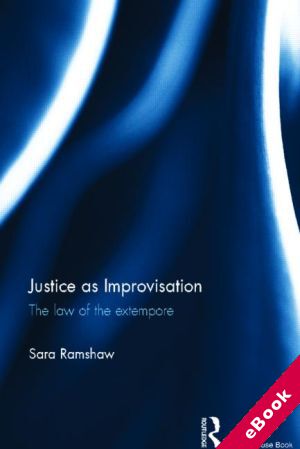
The device(s) you use to access the eBook content must be authorized with an Adobe ID before you download the product otherwise it will fail to register correctly.
For further information see https://www.wildy.com/ebook-formats
Once the order is confirmed an automated e-mail will be sent to you to allow you to download the eBook.
All eBooks are supplied firm sale and cannot be returned. If you believe there is a fault with your eBook then contact us on ebooks@wildy.com and we will help in resolving the issue. This does not affect your statutory rights.
Justice as Improvisation: The Law of the Extempore theorises the relationship between justice and improvisation through the case of the New York City cabaret laws. Discourses around improvisation often imprison it in a quasi-ethical relationship with the authentic, singular 'other'. The same can be said of justice.
This book interrogates this relationship by highlighting the parallels between the aporetic conception of justice advanced by the late French philosopher Jacques Derrida and the nuanced approach to improvisation pursued by musicians and theorists alike in the new and emerging interdisciplinary field of Critical Studies in Improvisation (CSI). Unlike jazz, law breathes tradition and is suspicious of improvisation. And what CSI brings to law and legal theory is the possibility of a richer notion of justice, which calls for 'spontaneity' in judgment as the constant negotiation between the freedom of the judge to take account of the otherness or singularity of the case and the existing laws or rules that both allow for and constrain that freedom. Instead of being illimitably free to make any decision, the judge improvises in relation to the law that already exists and to the society and community for whom she or he is judging. Conceiving judgement in this way, Justice as Improvisation book calls for an increased recognition of the improvised creativity that lies at the heart of legal reasoning.